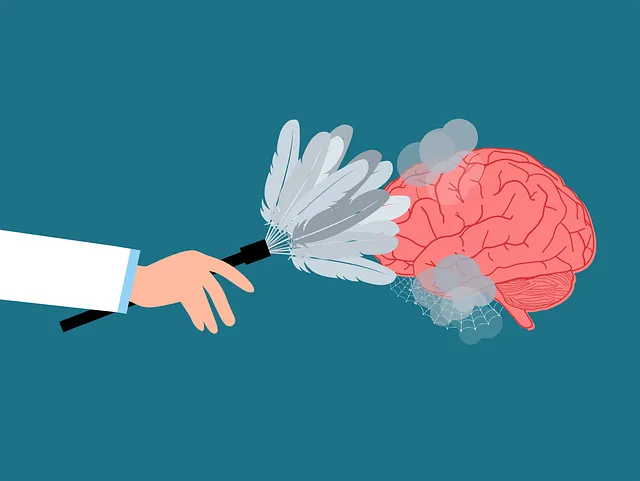Kaiser Permanente's training programs in Englewood address a critical gap by focusing on social skills development for individuals with mental health conditions, empowering them to overcome barriers, improve relationships, and reduce stigma. These evidence-based initiatives equip professionals with tools for complex scenarios, enhance patient outcomes, and foster inclusive practices through continuous improvement, cultural sensitivity, and practical role-playing.
Social skills training is a powerful tool in supporting individuals with mental health conditions, fostering better connections and improving overall well-being. This article explores the intricate relationship between social skills and mental health, highlighting the impact of initiatives like the Kaiser Permanente training programs in Englewood. We delve into common challenges presented by various mental health conditions and their effect on social interactions, offering insights on designing effective training modules and implementing support strategies for continuous improvement.
- Understanding Social Skills and Mental Health: Unraveling the Connection
- The Role of Kaiser Permanente Training Programs in Englewood
- Identifying Challenges: Common Mental Health Conditions and Their Impact on Social Interactions
- Designing Effective Social Skills Training Modules
- Implementation and Support: Strategies for Continuous Improvement
Understanding Social Skills and Mental Health: Unraveling the Connection

Social skills are integral to our daily interactions and well-being, yet individuals with mental health conditions often face challenges in this area. Understanding this connection is crucial, especially when considering programs like Kaiser Permanente training in Englewood that aim to address these issues. Mental illness can impact an individual’s ability to initiate and maintain conversations, interpret social cues, and manage emotional responses during social exchanges. This can lead to feelings of isolation and further contribute to the stigma surrounding mental health.
The link between social skills and mental health is complex. Effective training programs, like those offered by Kaiser Permanente in Englewood, focus on enhancing communication strategies and building confidence to combat these challenges. By learning practical tools for navigating social situations, individuals can improve their relationships, boost their self-esteem, and even reduce stigma through open dialogue and increased understanding. These efforts are vital in fostering a supportive environment where mental illness is demystified and those affected can thrive.
The Role of Kaiser Permanente Training Programs in Englewood

In Englewood, Kaiser Permanente training programs play a pivotal role in empowering mental health professionals with essential skills to navigate complex client scenarios. These comprehensive programs delve into various aspects, from effective communication techniques to trauma-informed care, aiming to enhance patient outcomes and professional well-being. By integrating evidence-based practices, the initiatives not only foster robust social skills but also address pressing issues like burnout prevention and risk management planning for mental health professionals.
Engaging in these Kaiser Permanente training programs allows practitioners to build resilience and improve their ability to support clients experiencing a range of challenges, including past traumatic experiences. Through ongoing education and exposure to innovative strategies, such as those offered in trauma support services, professionals are better equipped to provide compassionate, effective care in even the most demanding situations.
Identifying Challenges: Common Mental Health Conditions and Their Impact on Social Interactions

Many mental health conditions can significantly impact an individual’s ability to navigate social situations, often creating challenges in connecting with others. Conditions such as depression, anxiety disorders, and schizophrenia are among the most prevalent mental health issues globally, each presenting unique barriers to healthy social interactions. For instance, individuals with depression may struggle with motivation and energy, making it hard to engage in social activities or maintain relationships. Anxiety disorders can induce feelings of fear and avoidance in social settings, potentially leading to isolation.
The Kaiser Permanente training programs in Englewood acknowledge these challenges and aim to empower individuals with mental health conditions to thrive socially. By addressing the impact of common mental health issues on social skills, these initiatives support a holistic approach to wellness, integrating mental health policy analysis and advocacy into their strategies. Enhancing mental wellness through social skills training not only benefits individuals’ personal lives but also contributes to a more inclusive society where folks with mental health conditions can participate fully in community life, fostering connections that reduce feelings of isolation and promote depression prevention.
Designing Effective Social Skills Training Modules

Effective social skills training modules for mental health conditions should be designed with a structured, yet flexible approach. At Kaiser Permanente training programs in Englewood, we emphasize real-world application and personalized learning paths. Each module begins with assessing individual needs and setting clear goals, ensuring that participants gain skills relevant to their specific challenges. This involves incorporating various techniques like role-playing scenarios, group discussions, and interactive workshops to foster practical understanding.
The curriculum focuses on promoting emotional well-being and positive thinking through lessons in emotional intelligence. Participants learn to recognize and manage their emotions effectively, improve communication strategies, and build healthy social connections. By combining theoretical knowledge with hands-on activities, these training programs empower individuals to navigate social situations more confidently, leading to improved overall mental health outcomes.
Implementation and Support: Strategies for Continuous Improvement

The successful implementation of social skills training programs for mental health conditions requires a multifaceted approach. Kaiser Permanente training programs in Englewood, for instance, have recognized the importance of continuous improvement and thus incorporate regular feedback mechanisms to adapt their strategies. This involves assessing participant progress through pre- and post-training assessments, focusing on both knowledge retention and skill application.
Additionally, fostering a culture of support within mental healthcare settings is vital. Mindfulness Meditation practices can enhance self-awareness among practitioners, leading to better interactions with patients. Moreover, Cultural Sensitivity in Mental Healthcare Practice ensures tailored approaches that respect diverse backgrounds, reinforcing the inclusivity and effectiveness of social skills training initiatives.
Social skills training, tailored to address mental health conditions, plays a pivotal role in enhancing well-being. As demonstrated by Kaiser Permanente training programs in Englewood, structured modules can effectively navigate challenges posed by various mental health disorders, fostering meaningful social interactions. By focusing on understanding the connection between social skills and mental health, implementing evidence-based training, and providing ongoing support, individuals with mental health conditions can improve their social capabilities, leading to more fulfilling lives and stronger communities.






